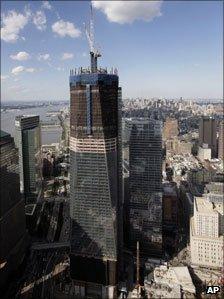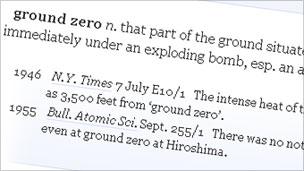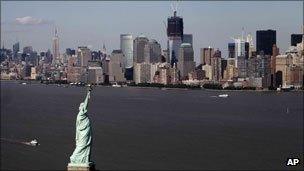Is it time to retire 'Ground Zero'?
- Published

The new tower, One World Trade Center, already dwarves the others
The Mayor of New York, Michael Bloomberg, has urged people to stop using the term "Ground Zero" when referring to the World Trade Center site. So is it time the term was retired?
The site of the World Trade Center may now have an 80-storey building rising up from its bowels, but it's still widely known as Ground Zero.
Not for much longer, the Mayor of New York, Michael Bloomberg, has urged.
"We will never forget the devastation of the area that came to be known as 'Ground Zero.' Never," he said in a speech about the rebirth of Lower Manhattan, external.
"But the time has come to call those 16 acres what they are: The World Trade Center and the National September 11th Memorial and Museum."
In explaining the mayor's comments, which provoked some strong reactions on Twitter, external, a spokeswoman says it is about starting a new chapter.
"The speech was about the future, about moving on and rebuilding Lower Manhattan," she says.
"The name 'Ground Zero' is associated with the events of 11 September 2001 and the World Trade Center is part of the future."
The term was first used in 1946 in a New York Times report about the bombing of Hiroshima in Japan, according to the Oxford English Dictionary, external, and it soon came to mean the ground underneath an exploding bomb.
Its first use in relation to 9/11 came within a few hours. "Ground Zero" is thought to have first been mentioned by a survivor in a television interview and subsequently by reporters.

In the years that followed, it became shorthand for the site, even after the new towers began to take shape.
People with a strong emotional connection with the area agree with the mayor.
"Ground Zero means there's nothing there but now they're rebuilding and they've done a beautiful job, we need to forget it," says Ester Di Nardo, who lost her daughter Marisa in the attacks.
"I like 'The World Trade Center and September 11 Memorial'. It's more appropriate."
Bloggers were already making the point that the word needed to be replaced, says lexicographer Ben Zimmer.
"It has a strong national resonance but there's a strong case to be made for moving away from it.
"It's now a bustling site with buildings going up, but Ground Zero keeps it fixed to that moment when the towers fell."
But you can't change language by edict, he says, and the mayor saying so probably won't have much effect.
"It's more symbolic, reflecting a particular perspective because he wants New York to be forward-looking."
It's impossible to predict what will happen, he says, but it's likely that people will develop alternative shorthand for the site.
People who work in the new buildings there may say "World Trade Center", says Mr Zimmer, while visitors to the site from outside NY may still call it "Ground Zero" while New Yorkers perhaps will call it "the 9/11 memorial".

The Manhattan skyline has been redrawn
"What's interesting is that Ground Zero doesn't really have much currency as a term in everyday New York life now," says Chris Smith, contributing editor for the New York Magazine.
"It's a graphic and unnecessarily Hollywood reminder of a terribly painful moment."
It has more circulation on cable news or among tourists than it does among New Yorkers.
Firefighters refer to "the site", or "the pile" if they were down there in the aftermath, says Mr Smith. Others still refer to the "World Trade Center" and that's remained the name of the subway stop.
The Mayor knows that the term "Ground Zero" is bad for business in an area trying to regenerate, says Mr Smith, and his suggested alternative has no chance of being adopted because it's too unwieldy.
But New Yorkers were never comfortable with it anyway, so moving on from the term won't be hard, he says.
Moving on from the event, however, will be a much more complicated process.